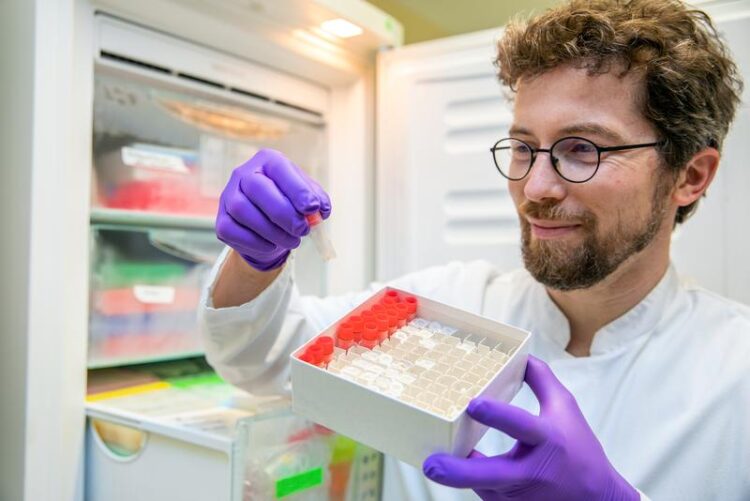New test improves diagnosis of rare liver disease

Dr. Richard Taubert with blood serum samples from the antibody studies on autoimmune hepatitis.
Copyright: Karin Kaiser / MHH
Polyreactive antibodies as markers for autoimmune hepatitis.
Autoimmune hepatitis (AIH) is a chronic liver inflammation that is triggered by an immunological malfunction. In this case, the immune system falsely recognises the patient’s own liver cells as “foreign to the body”. The symptoms of this rare liver disease are unspecific, and the exact cause is not yet known. If left untreated, AIH can lead to abnormal scarring (fibrosis) of the liver, which can end in cirrhosis and require an organ transplant. For successful treatment, the disease must be detected as early as possible. A research team led by Dr. Richard Taubert, senior physician at the Department of Gastroenterology, Hepatology and Endocrinology at Hannover Medical School (MHH), has now developed a new antibody test that can be used to diagnose the disease more quickly and reliably than previous standard tests. For this purpose, the scientists examined more than 1,000 blood samples from ten European centres for liver diseases. The results have been published in the renowned scientific journal Hepatology.
Conventional tests only partially reliable
Type G antibodies – also called immunoglobulins G (IgG) – are proteins, i.e. protein compounds. The immune system sends them out to neutralise pathogens such as bacteria and viruses. In autoimmune diseases, the immunoglobulins falsely recognise their own body as foreign and are therefore called autoantibodies. “The detection of autoantibodies is an important basis for AIH diagnosis and, along with tissue examinations after liver biopsy, represents the most important diagnostic marker,” says Dr Taubert.
However, the various autoantibodies detected in conventional tests so far are only of limited use for an accurate diagnosis. For one thing, they are not found in everyone who actually suffers from AIH, and for another, they can also be detected in other diseases and are therefore not specific. The research team therefore set out to find precise autoantibodies that are typical for AIH and differ from the markers for other liver diseases. In the process, they came across an unusual immunoglobulin in the blood of AIH patients. “They have the special property of being able to bind with very many human proteins,” explains the gastroenterologist.
New test closes diagnostic gap
These so-called polyreactive immunoglobulins (pIgG) attach themselves, among other things, to a certain protein called HIP1R, which is found throughout the body and not only in the liver. “With this binding to HIP1R, we can detect the polyreactive immunoglobulins and use them for diagnostics,” says Dr Taubert. Compared to the conventional autoantibodies that have been used to date for the diagnosis of AIH, the pIgGs are much more accurate. This means that even AIH sufferers who do not form classic autoantibodies can be detected by blood test.
“Our new test closes a diagnostic gap and helps to improve patient care,” emphasises the physician. With the new test, which already provides results within half a day, numerous patients with liver disease could be spared a liver biopsy. The MHH research team has already been able to test the reliability of the new test on several hundred blood samples from other member centres of the European Network for Rare Liver Diseases (ERN rare liver). The aim now is to make the test available to as many laboratories as possible. A patent has already been granted by the European Patent Office.
In addition to the MHH Department of Gastroenterology, Hepatology and Endocrinology, the Departments of Rheumatology and Immunology and the Department of Neurology with Clinical Neurophysiology were also involved in the project.
SERVICE:
For further information, please contact PD Dr. Richard Taubert, taubert.richard@mh-hannover.de, telephone (0511) 532-6766.
The original paper “Quantification of polyreactive immunoglobulin G facilitates the diagnosis of autoimmune hepatitis” can be found here:
https://aasldpubs.onlinelibrary.wiley.com/doi/10.1002/hep.32134
Media Contact
All latest news from the category: Health and Medicine
This subject area encompasses research and studies in the field of human medicine.
Among the wide-ranging list of topics covered here are anesthesiology, anatomy, surgery, human genetics, hygiene and environmental medicine, internal medicine, neurology, pharmacology, physiology, urology and dental medicine.
Newest articles

Parallel Paths: Understanding Malaria Resistance in Chimpanzees and Humans
The closest relatives of humans adapt genetically to habitats and infections Survival of the Fittest: Genetic Adaptations Uncovered in Chimpanzees Görlitz, 10.01.2025. Chimpanzees have genetic adaptations that help them survive…

You are What You Eat—Stanford Study Links Fiber to Anti-Cancer Gene Modulation
The Fiber Gap: A Growing Concern in American Diets Fiber is well known to be an important part of a healthy diet, yet less than 10% of Americans eat the minimum recommended…

Trust Your Gut—RNA-Protein Discovery for Better Immunity
HIRI researchers uncover control mechanisms of polysaccharide utilization in Bacteroides thetaiotaomicron. Researchers at the Helmholtz Institute for RNA-based Infection Research (HIRI) and the Julius-Maximilians-Universität (JMU) in Würzburg have identified a…



